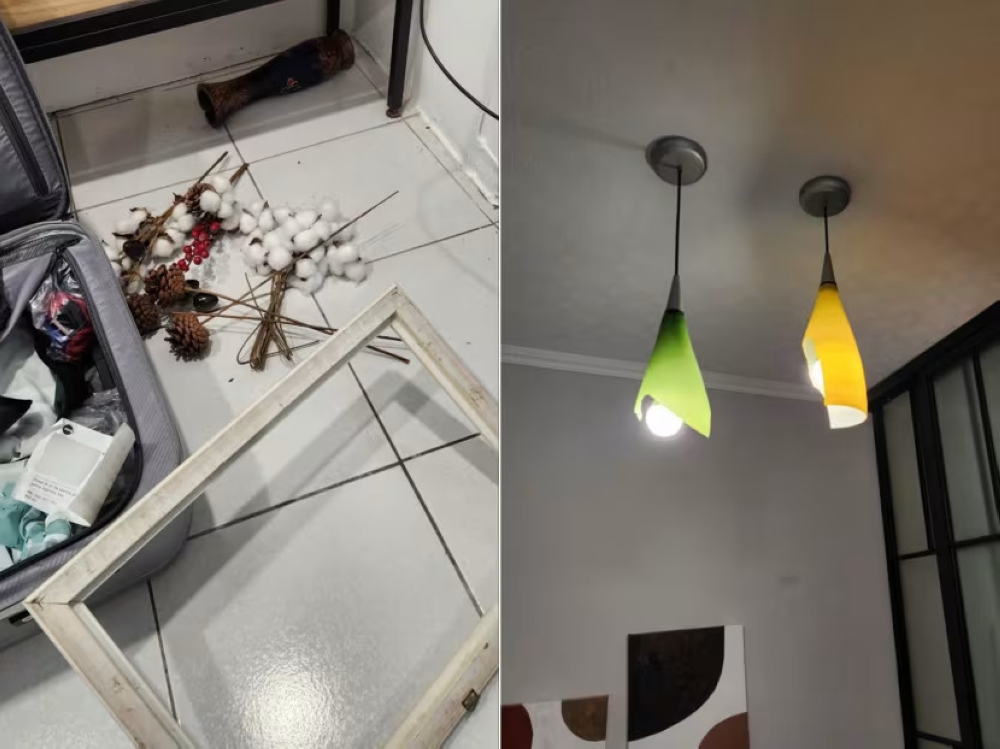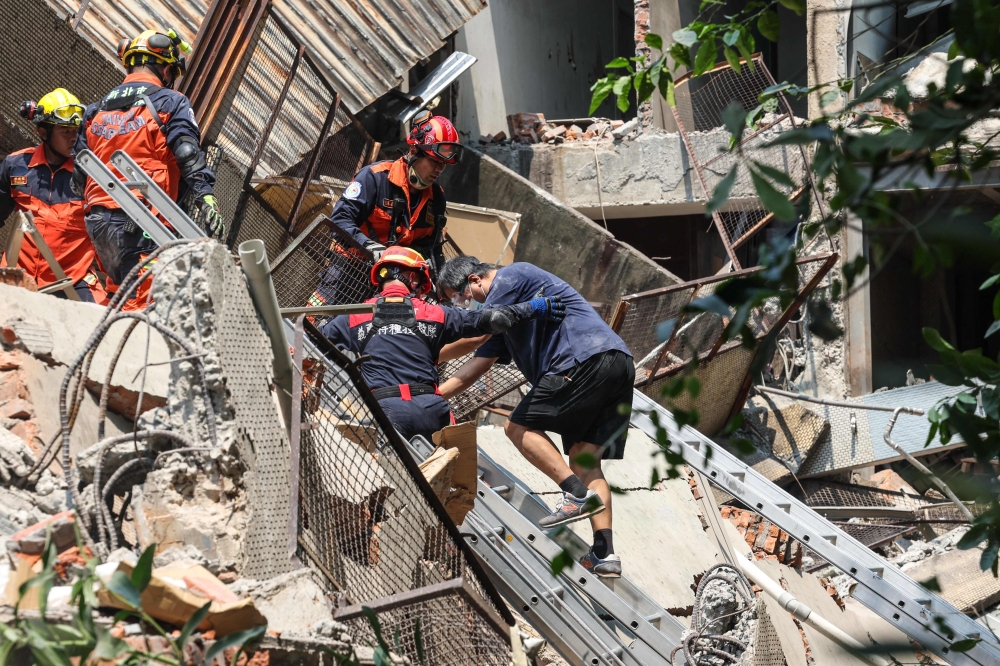SINGAPORE, April 4 — Jolted awake by tremors that violently rattled his Airbnb apartment in Hualien, Taiwan yesterday (April 3) morning, a dazed Singaporean tourist, Mr Ryan Foong, decided to remain in his room as he was unsure what else he could do.
A couple of his fellow travellers had fled the apartment on the ground floor to seek the safety of open ground. Another friend, who was showering at the time, remained indoors with Mr Foong, 29.
“I just stayed in my room, because I don’t know what’s the protocol for earthquakes beyond just finding cover under things like tables,” said the co-founder of production house Not Brothers Co.
Mr Foong and his friends were travelling in mountainous and sparsely populated eastern county of Hualien as part of a three-day trip when Taiwan’s biggest earthquake in 25 years struck the island.
Hualien, famed for the valley of Taroko Gorge oft visited by tourists, also happened to be near the epicentre of the magnitude 7.4 quake, which occurred at about 8am local time (8am SGT).
As of 6pm yesterday, the earthquake resulted in nine deaths and more than 800 injured. A total of 50 people were still missing.
Singapore’s Ministry of Foreign Affairs (MFA) said in a statement there were no reports of Singaporeans injured as a result of the earthquake as of Wednesday evening.
“I was prepping for the worst and kept looking at the ceiling to see if it would collapse,” Mr Foong said of his experience.
“I wasn’t nervous, but it did feel surreal. You don’t expect anything like this to happen when you’re on holiday.”
The four Singaporeans were lucky: They were not hurt, and the apartment did not suffer from significant damage.
Taking stock after the quake, the incident only caused two light fixtures to shatter and dislodged some wall-mounted paintings. A water pipe in the apartment above them also burst.
But the same could not be said for other parts of Hualien. They later learned that two tall buildings in the rural county collapsed, including one that was at the vicinity of their apartment.
Speaking to TODAY while on a train to Kaohsiung in southern Taiwan, he said their original plans to head north to Taipei for their flight home were disrupted by the damage to roads and highways.
As a result, they had to make a detour around the south of the island instead.
“We might not make it for the last train to Taipei tonight, so we might need to find accommodation in Kaohsiung,” he said, adding that they do not intend to head back to Singapore earlier.

‘Everything was in a mess’
Meanwhile, other Singaporeans in Taiwan, such as singer and actress Olivia Ong, decided to cut their trips short instead.
The 38-year-old was in Taiwan for her concert on March 31 and had plans to spend time in Taipei till April 8. She managed to snag flight tickets for an earlier flight out of the island.
Recounting the moment the quake hit, Ms Ong, who was in Taipei with her manager and another friend, said: “It was really scary and we were shaking. We were struggling to stay calm.”
“Several vases and picture frames broke, and water leaked from the lights in the bathroom... Everything was in a mess.”
Feeling unsafe staying in the apartment, the trio later found a hotel to stay in for a night and booked the earliest flights they could back to Singapore.
This was not the first time Ms Ong had experienced an earthquake, as she had witnessed a magnitude 4.8 earthquake during her high school years in Japan.
That paled in comparison to the magnitude 7.4 quake in Taipei on Wednesday, she said.
“I knew what to do in an earthquake. My first instinct is to protect my head, avoid standing near windows and open the main door so it would be easier to escape in case the building collapses,” she told TODAY.
For Ms Dorin Poh, 52, a freelance project manager who has lived in Taipei for 22 years, Wednesday’s earthquake was the most severe that she has experienced so far.
“At first I thought it was my husband just turning around in bed, but then I see everything in the house start swaying and the water in my cup was spilling,” she said.
“People were shouting and we heard car alarms trigger. Our neighbours were talking about how scared they were because of the earthquake... The last time we felt anything like this was during 921.”
She was referring to the magnitude 7.3 1999 Jiji earthquake that struck Taiwan on Sept 21, 1999. More than 2,400 people were killed and injuries exceeded 11,300 in what was dubbed one of Taiwan’s worst earthquakes.
Tax consultant Nicole L, who declined to give her surname, likened the earthquake and its aftershocks to the dizzy feeling of disembarking from a cruise ship.
“You feel like you’re still rocking in sea, despite being on land,” said the 28-year-old who was in Taichung with her family.
With the earthquake impacting train services on the island, the family decided to get on a train at 1.30pm, reaching the airport in time for their flight back home at 5.45pm.
The earthquake could be felt throughout the island, including in the southernmost cities far from the epicentre.
In Tainan, 28-year-old art gallery manager David Loh recalled how he and his friend were also rudely awakened by the earthquake.
They quickly ran out of their hotel room on the 13th floor, which he recalled was “swaying and shaking”.
They took their belongings with them as they fled, and later stayed on the ground floor with other hotel guests.
“Things were much calmer on the ground. But after that, we couldn’t go back to sleep. So, we went for breakfast... because we were on (full) alert,” said the tourist.

Being prepared, stocking up for aftershocks
While speaking to TODAY from Taipei at around 3pm, freelance consultant and producer Phyllis Jeannemarie Wan, 31, said she could still feel aftershocks, even though it had been hours since the earthquake happened in the morning.
She said: “I think the initial quake lasted a couple of minutes, but the aftershocks happened rather quickly and were quite strong as well.”
Ms Wan, who lives in the Xinyi district of Taipei, said she also saw the metro train shudder during the quake as it travelled along the tracks past her window.
With the Taiwanese authorities not ruling out further aftershocks, Ms Wan and other Singaporeans said they planned to stock up on essentials, such as food and first aid supplies.
Mr Lua Ming Kai, 34, a Singaporean owner of Ah Bee Bakery in Taipei, also sought to make repairs to his home as soon as possible, in case another emergency happens.
But with others also having similar ideas, Mr Lua has not been able to get hold of an electrician to make sure that the gas lines and electrical systems in his home are fine.
“Hopefully, (the electrician) will be able to come by tomorrow,” he said.
He told TODAY he realised how dire the situation was when he saw how urgently the local Taiwanese people fled their homes.
“There are often earthquakes here, and most of time, people in Taipei are not so tensed up by them,” he said. “When I saw them leaving their homes, I thought ‘this must be serious’.”
MFA said that in view of possible aftershocks, Singaporeans in Taiwan are advised to remain vigilant, take all necessary precautions for their personal safety and heed the instructions of the local authorities.
Singaporeans in Taiwan who require consular assistance may contact the Singapore Trade Office in Taipei, or the 24-hour MFA duty office hotline at +65 6379 8800 or 8855. — TODAY






















